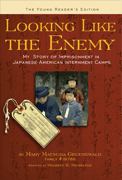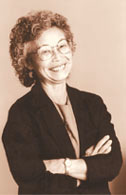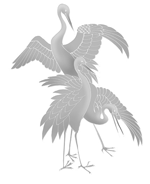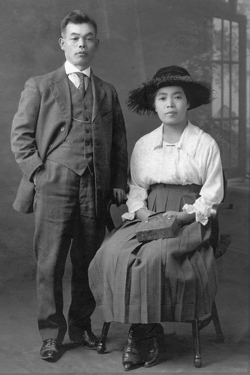
|
ISBN 978-0-939165-58-2
|
When Mary Matsuda was 16 years old, her life changed forever. Mary's happy, carefree life growing up on a berry farm in Washington state ended the day the Japanese bombed Pearl Harbor. Along with her brother Yoneichi, and her parents, Mary was forced to leaver her Vashon Island home and face imprisonment in Japanese-American internment camps during World War II. Why? Because Mary was Japanese American and she looked like the enemy. Just when Mary was preparing to spring into adulthood, her life tumbled into uncertainty and an unknown future. She wondered if she would ever see her home again, or worse, die. For four years, the Matsuda family faced hardships, anxiety and discrimination, but in the end they persevered. Mary's story is honest, heartbreaking, and hopeful. Her life will inspire young readers to find strength as they face their own difficult times. For ages 9 and up. This Young Reader's Edition of Looking Like the Enemy introduces younger readers to U.S. history through the details of this personal and riveting story. There are several educational tools for young readers, including:
|
|
|
|
Download the Author Interview here Q: When did you decide to write a book about your experiences in Japanese-American internment camps? What inspired you to start writing? A: I began my initial writing efforts in 1995 after my son David asked about what happened to our family during World War II. When my children were young, I had told them little stories about the internment camps, in particular the lighter side of life at that time. I never spoke about the difficult experiences. In 1999, Seattle writer and teacher, Brenda Peterson, invited me to join her writing class, and I realized I was ready to begin writing seriously about my experiences. At first, I thought I was just writing down my story to share with my family. But after a few years, around 2002, my writing teacher and classmates strongly encouraged me to consider writing a book for publication. Q: How long did it take you to write your book and what was that experience like? A: It took me about 10 years to get the story out of me and onto the paper. So, I began writing when I was 70 years old, and held my first published book in my hands when I turned 80 years old! Initially, I was frustrated and discouraged because I had buried my feelings about all those years in the internment camps. I had to overcome the Japanese cultural norm of keeping silent about one’s painful experiences. Traditionally, Japanese people do not openly express or discuss their disappointments or struggles. Also, when I began writing, I didn’t want to show my grown children how I felt about being imprisoned in internments camps. I was afraid I would begin to cry and not be able to stop. Once I got over my fear of opening up, I did spend a lot of time crying, mostly when I was alone sitting in front of my computer. I had to remember the pain wrapped up in all those memories in order to be able to write about them. My writing teacher and my seven classmates were very supportive during this process. One of the assignments my writing teacher gave me to help me overcome my resistance to opening up was to buy a Japanese doll to replace the ones my family burned prior to our evacuation. Another thing that helped me open up to the memories and my deep feelings was to buy a CD with a Japanese song, “Sakura,” that was so familiar to me during my childhood. Sakura means cherry blossom in Japanese. It is a simple, beautiful melody that helped me to reconnect with what it is like to be Japanese. Q: What was it like to remember the events from your youth and write about them? A: It was extremely difficult to go back and explore and feel the emotions that accompanied our evacuation more than 50 years earlier. Once I began writing, it was like the dam broke: the emotions gushed out of me at times so intensely that I had to stop whatever I was doing and allow myself to feel the pain, fear, disappointment and anger before I could continue. Q: Did you learn new things while you researched and wrote your book? A: Yes, many things. I didn’t know much about the courage of the soldiers of the 442nd Regimental Combat Team, who fought so bravely in Europe during World War II. Since my brother, Yoneichi, never spoke about the War, I had to turn to books to find out what he went through as a soldier. In fact, I didn’t even know my brother was awarded a Bronze Star for bravery until after he died many years after the War. I also learned much more about the difficulties within the Japanese-American community regarding the Loyalty Oath we all had to sign while in the internment camps. At the time I was 18 years old and I only understood the “Yes Yes” side of the argument. More than 50 years later while researching for my book, my eyes were opened to understanding the other side of the argument—the families who signed “No No” to the Loyalty Oath. I didn’t really understand Japanese-American families who disagreed with the U.S. government until I met and became close friends with a “No No” family, and heard their viewpoints. In my research, I was especially glad to learn more about the movement that eventually lead to a formal apology from the President to all Japanese Americans held in internment camps, along with reparation payments to the survivors of the internment. This led me to study South Africa’s Truth and Reconciliation Commission, established by President Nelson Mandela in 1995 to reveal the South African government’s past racial injustices and resolve the conflicts in order to find national unity. In learning about Nelson Mandela, I found even more reasons why it is so important to look for ways to reduce conflict and work for reconciliation. Q: Now that you are in your 80s, do the experiences in the internment camps still affect you? A: I have come to look at conflict in different ways. I am more at peace with myself, and more resolved to extend my efforts towards the needs of others. Q: What did your children think when they read your memoir? A: My children originally felt “exposed” when they read parts of my writing, but they were pleased to know how our family dealt with the difficulties during that time. They became even more proud of our family and learned a great deal of our family history that they didn’t know before. Q: Why did you decide to do a Young Reader’s edition of your memoir? A: I have always enjoyed speaking to young children and middle- schoolers about my experiences in the Japanese-American internment camps, especially because I was only 17 when my family was removed from our home. In addition, I believe it is so important for children to understand all the parts of our country’s history, even the parts we are not proud of. We can learn from our mistakes, and hopefully, not make those mistakes again. My publisher and editor, Maureen R. Michelson, encouraged me to consider a Young Reader’s edition of my memoir. I immediately recognized the importance of young people being exposed to the experiences of other young people who suffer judgment, rejection, and negative encounters based on outward appearances. Q: How has writing this book changed your life? A: As a published author, I am more in the public eye and find greater demands on my time. Looking Like the Enemy is a very personal story, and many readers are interested in sharing their own family’s experiences with me. I have been touched by their stories and I have met many wonderful people as a result of writing my memoir. I find it fascinating how some people are drawn to me because of this book. I think this is because no matter what happened to us, my family found the strength to overcome many obstacles and emerge even stronger as a result. My hope is readers will draw on the power of the written word in order to overcome their own difficulties. I have heard many stories as fascinating as my own, and I often encourage people to write down their stories for their own families. Writing is a powerful way to heal, to connect, and to demonstrate love for other people. I would like nothing better than for some of my young readers to find out more about the stories of their own families, which are just as unique and important as my family’s history is. Q: Have you visited Japan? How did the Japanese people receive your story and your book? A: I traveled on a three-week book tour throughout Japan in April, 2005. I found the people very gracious, accepting, and curious about the Japanese-American experience during World War II. Japan is an amazing country, and I was treated like royalty during my visit. It was a privilege and an honor to be welcomed there. Q: How did your trip to Japan affect you? What was the most inspirational? What was the most difficult? A: Before the trip, I was somewhat fearful about going since I had not spoken any Japanese since my mother died in 1965. I need not have worried. People were very gracious and helpful. I gave several book readings and shared my story with people in Japan. The son of one of my cousins (on my mother’s side) met me in Kyoto, Japan and he took me to meet his mother. She was the wife of my cousin who had died. Normally, gatherings in Japan are conducted in restaurants or other public places. I knew that it was a great honor to be invited into this 83 year-old woman’s house to meet her. When I met Shizuko-san, the traditional Japanese form of greeting someone for the first time flowed spontaneously out of my mouth! It felt like my mother was inside of me addressing Shizuko-san in the formal, gracious way that was traditional in 1920. I was astonished and so was she. This was the first time I had spoken Japanese in 45 years! I went to many other places in Japan and met many other wonderful people, but the highlight of the whole trip was meeting this relative. Q: What do you hope young people will get from reading your book? A: The title of the book says it in a nutshell. We should not judge people by the way they look. Q: As your book goes to press in 2010, what are you working on? A: I am working on a new book based upon the wisdom of my mother, which is now a part of who I am as an elder. I plan to have the book also available as an audio book and I will be the reader. Q: Do you have any final thoughts you’d like to share with your young readers? A: All of us are very much like one another regardless of our backgrounds or where we live in the world. We all need adequate food and shelter, as well as friendship and companionship. All of us need to be safe from harm of whatever kind and most of all, we need to be accepted for who we are, not for what we look like. |
|
|
CONTENTS
|
Chapter One:
|




 I will always remember the day my life changed forever.
I will always remember the day my life changed forever.